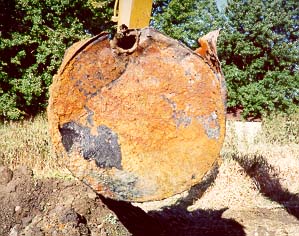If you are thinking of buying a home, mechanic shop, gas station, automotive shop or any property which utilizes underground fuel or oil storage, get your soil tested!

If an underground oil tank at a property is 15-20 years old the chances of a leak are high and you need to have the tank tested. Even if the tank is not leaking now and has not already leaked, if there is an old, buried steel tank at a property you should plan on replacing it before it leaks not afterwards.
Home buyers and property owners should have a soil test performed on your underground oil or fuel tank. It is recommended to have a soil test rather than a pressure test of an existing oil tank, since even if the tank is not currently leaking because you would prefer an assurance that it didn’t leak before, say from a plumbing connection that was repaired.
Hire an expert to find hidden or buried tanks, abandoned tanks, or to test existing tanks: Specialty companies and some oil companies have equipment to test buried tanks for leaks. Tanks and soil around and below tanks are tested for evidence of leakage using:
Common Oil Tank Leak Tests
Common oil tank leak tests listed below can tell you if a tank has already leaked and can help assess the chances of an upcoming oil tank leak. These are just some of the tests performed which can help eliminate the potential of a fuel leak or worse.
- Soil testing looks for evidence of actual oil contamination in the soil. A proper soil test is based on having located the buried tank or the site where a tank was buried, and taking borings to a depth approximately just below the tank bottom.
- Water testing in oil tanks can indicate the risk of in-tank corrosion and thus leakage an easy first-pass which can be used at both above ground tanks and buried oil tanks.
- Low-psi tank pressure-testing is used to test a tank for existing leaks.
- Electronic testing can also screen tanks for evidence of damage – usually this is used only on commercial jobs.
- Ground scanning radar or magnetic sensing is also used to locate buried steel tanks.
There are several issues surrounding underground fuel oil storage tanks (USTs)—environmental, safety, economic and legal. Such issues have increased concerns among homeowners, home buyers, lenders and real estate agents…and for good reason. Among the more pressing issues involving USTs are: soil and groundwater contamination; fire risk and tank collapse; high maintenance costs; contamination cleanup; and third party damages.
Before purchasing a home or property, it is strongly recommended that buried tanks be tested. The liability surrounding a leaking tank becomes the responsibility of the new owner after the property is purchased. The cost for a soil test on a residential tank generally ranges around just a few hundred dollars or less. Don’t take the risk of not testing your underground fuel tank or we all pay in the end.
